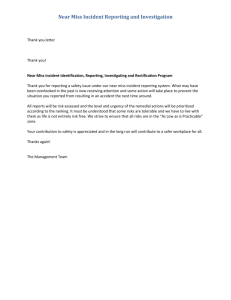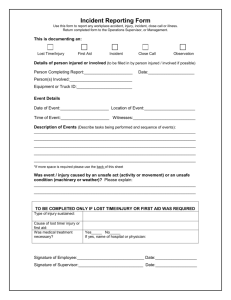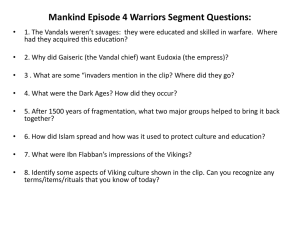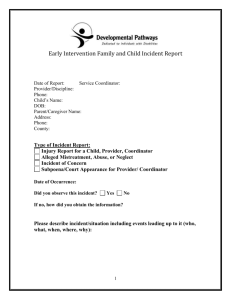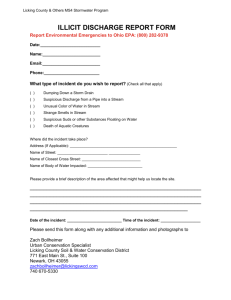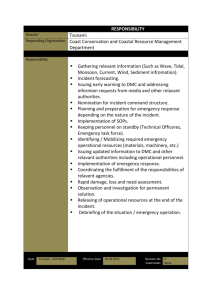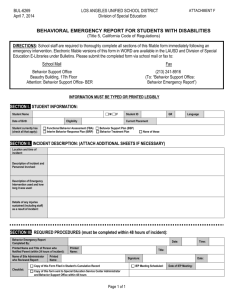Media--Incom-The-Cooney-Lecture--
advertisement
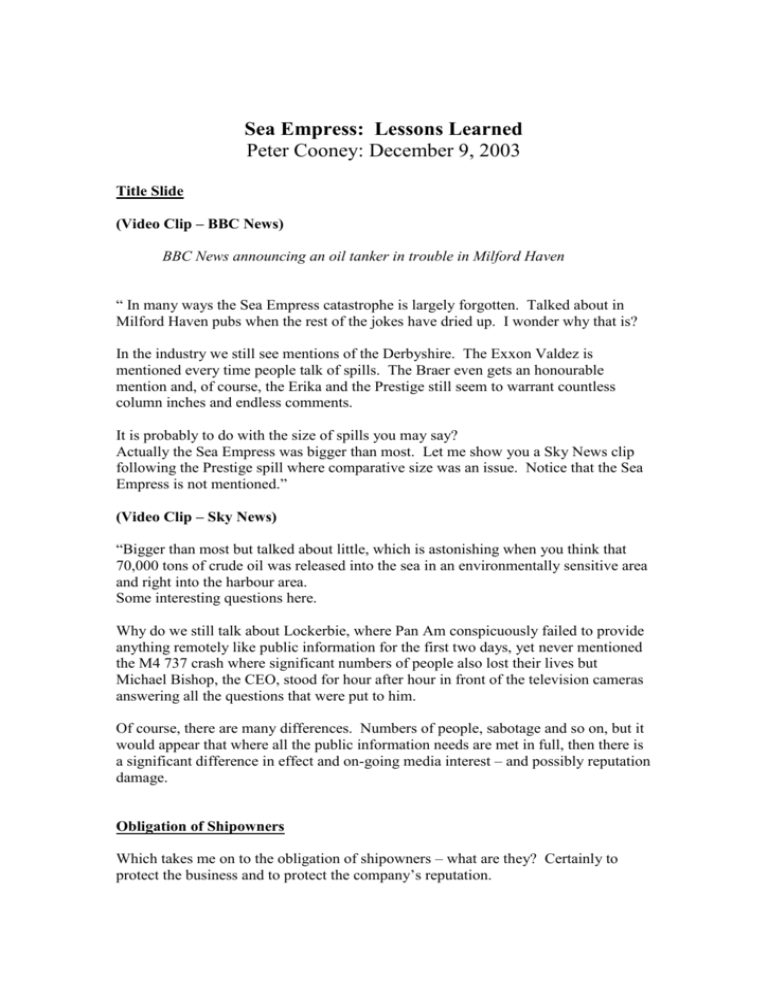
Sea Empress: Lessons Learned Peter Cooney: December 9, 2003 Title Slide (Video Clip – BBC News) BBC News announcing an oil tanker in trouble in Milford Haven “ In many ways the Sea Empress catastrophe is largely forgotten. Talked about in Milford Haven pubs when the rest of the jokes have dried up. I wonder why that is? In the industry we still see mentions of the Derbyshire. The Exxon Valdez is mentioned every time people talk of spills. The Braer even gets an honourable mention and, of course, the Erika and the Prestige still seem to warrant countless column inches and endless comments. It is probably to do with the size of spills you may say? Actually the Sea Empress was bigger than most. Let me show you a Sky News clip following the Prestige spill where comparative size was an issue. Notice that the Sea Empress is not mentioned.” (Video Clip – Sky News) “Bigger than most but talked about little, which is astonishing when you think that 70,000 tons of crude oil was released into the sea in an environmentally sensitive area and right into the harbour area. Some interesting questions here. Why do we still talk about Lockerbie, where Pan Am conspicuously failed to provide anything remotely like public information for the first two days, yet never mentioned the M4 737 crash where significant numbers of people also lost their lives but Michael Bishop, the CEO, stood for hour after hour in front of the television cameras answering all the questions that were put to him. Of course, there are many differences. Numbers of people, sabotage and so on, but it would appear that where all the public information needs are met in full, then there is a significant difference in effect and on-going media interest – and possibly reputation damage. Obligation of Shipowners Which takes me on to the obligation of shipowners – what are they? Certainly to protect the business and to protect the company’s reputation. Contingency Planning It is all about ‘Contingency Planning’ - How real is the plan? - How quickly can it come into play? - What human and other resources are required? - And what is the make up of the team you need? Crucial questions that came into sharp focus at the time of the Sea Empress grounding – and are equally, if not more important today. Let me go back to the Sea Empress incident and remind ourselves of what actually happened. Here is a short clip from the in-house video that we made at Acomarit of the run up to the grounding and the incident itself. This was a video we made for all the seafarers and indeed the charterers, to ensure that everyone knew what had happened prior to the salvage operation and what lessons had to be learned.” (Video Clip – Acomarit: Lessons Learned) “Sitting at home, I first heard of the incident at around 8.45 in the evening. The grounding had happened some 35 minutes before. As with all incidents there is considerable confusion in those first few hours. Trying to establish what had happened, and what would be the likely outcome was very difficult. We were getting messages from the Russian Master Capt, Bolgov, and subsequently from Milford Haven and the local coastguard. The ship was telling us that they thought around 500 tons of cargo had been released from the starboard wing tank that had taken the full brunt of the impact of the rock For me that was quite enough and we immediately mobilised all the people we could find to travel to the scene. Not easy in the middle of the night, but by midnight we had chartered a plane, found the people and we were on the way. We also called our media response team in London and they too left by car that night to be in Milford Haven by the morning. (Picture - Milford Haven MAP) As we began to comprehend the enormity of the incident we deployed more and more resources to Milford Haven, not only to support the physical response effort, but also to deal with the growing army of press and television crews gathering on-site. Time and tide, rather like the broadcast media, waits for no one and we knew it was important to catch the breakfast television programmes and try, at least, to influence the news agenda. It is important to remember that many Acomarit senior staff had been through television and media training courses before the Sea Empress incident and we had a well drilled programme in place and a highly professional out sourced company able to support our media effort. By 9.45 on the evening of the grounding we had established a public information media desk in London manned by five or six responders and they continued work through the night – and through the next five days. (Polluted Beach Picture) I was in Milford Haven with an excellent team of specialist, superintendents and an on-site media team who were keeping us up to date with what the media were saying and arranging our interviews and generally keeping the media in touch with the position.” Three days into the incident, nothing much had been resolved and pressure was running high. (Video clip from Panorama Film – day 4) “We were involved initially in the twice daily press conference and general briefings that were taking place under the glare of the television lights, but while everyone was trying very hard with limited experience, the strain was beginning to tell.” Media Strategy “Throughout the incident we needed a ‘Media Strategy’. We had to be flexible. Do we work within the general press conference environment alongside everyone else? Or do we work outside and focus on the issues we believe are important to us? We didn’t feel that as manager we were being well served by being involved in the daily bun fight. What we decided to do therefore was to hold our own press and television briefings from the top of Queen Anne’s Head and other spots. Things weren’t going too well with the salvage operation which was proving very difficult and we decided that we needed to take unilateral action to be able to set the media agenda. This strategy worked well, although I would caution anyone to try to stand up in front of television cameras and give interviews all day and for days at a time. Everyone gets very tired and mistakes start to be made.” Agendas! “It is important to remember that there are a large number of people involved in an incident the size of the Sea Empress and a large number of agendas. These agendas are not necessarily supportive to the shipowner or manager. I was fortunate in having trained colleagues who could step into the breach and take over the public information duties. Also the importance of the on-site media team cannot be over emphasised, as they were there to make all the arrangements and answer the basic media questions time after time. Also we were able to harness the support of outside associations like Intertanko to appear on national television and present a balanced view of what had happened without the usual hyperbole. As ship managers we believed it was our duty to be fully transparent and protect the shipowner from the full enormity of what had happened; also, the charterer, neither of whom were involved in the day-to-day operation of the vessel. By meeting the media and publics’ needs in full we seemed to have delivered this protection and it was some five days after the initial grounding that the owner’s name appeared in the international and British media. When the Panorama programme decided to make a 45 minute documentary on the whole affair, after it was all over, we thought long and hard as to whether or not to appear. Again, in consultation with our media specialist we decided that there were still a few unanswered questions and that we could finally put the whole sorry business to rest by participating. The strategy had some risks but we thought that the benefits were real and achievable. Here then is the video clip of my final comments on the subject. They speak for themselves.” (Video Clip Panorama - “It’s a disgrace etc”) “So what are the lessons to be learned from the Sea Empress incident and those that have come since, the Erika and the Prestige to name but two. Incidents that have marked significant changes in the way that governments, regulators and the public view shipping and the tanker sector in particular. Here are a few thoughts, which by no means present a comprehensive view, nor ones that you can say conclusively ‘this is what went wrong and this could have been the formula for success.’” Skill Gap “First let me talk a little about the Skill Gap. We might be good technicians, operations people, superintendents or crew managers. A crisis is the greatest test for any management. New skills have to be found in managing people, dealing with differing agendas, as I mentioned, and in dealing with the media and public information – an area which is certainly not for the uninformed or untrained. An additional problem is that no two incidents are ever the same. Brent Spar was different from Bhopal, the Tricolor was different from the Cormo Express sheep carrier. The Braer had markedly different characteristics from the Sea Empress. And the Erika and Prestige were themselves different incidents, in many ways, from one another. All have to be managed and require significant communication skills. Now let me turn to transparency – one of the most important words in a shipowners vocabulary these days” Accountability, Responsibility “The ability to be accountable, responsible and transparent seems to be fundamental to getting it right following an incident. The A_R_T of politically correct incident response you might call it. What does it mean; simply that someone – either manager or owner or both has to stand up and be counted. Not the PR man, not the lawyer. Not the QI, not the Class society, but the individual or individuals responsible for putting the ship on the water and for its day- to -day management. If any of the fundamental questions about responsibility go unanswered, then there remains the nagging doubt that something is being held back, something is not quite right. Simple psychology; simple solution; simple way of getting it right - be transparent. If we think about the incidents involving the Exxon Valdez, Braer, Sea Empress, Erika and Prestige, let us think for a moment who was accountable and who took responsibility. Outside shipping, let us also consider the Lockerbie disaster where no one seemed accountable for days and contrast this with the M4 air crash where the CEO stood for hours in front of the T.V cameras. Perhaps there are some important lessons to be learned from these examples.” Transparency “It’s all about the transparency and the need for a credible individual from the shipowners or manager to come forward and take ownership of the incident – if not the cause. This video clip and interview with the ERIKA’s owner from the BBC’s film, says it all. (Video Clip – ERIKA Film) One voice – one message! Analysing both the Erika incident and that of the Prestige, there appeared to be not only to be a lack of true transparency but also no common or consistent message coming through from those responsible. In a big incident, there will always be the doubters and the forces of darkness. To get the job done correctly, it is necessary to collect all those who can conceivably be on your side and ensure continuity of message and even style. Who am I talking about? Certainly owner and manager – if there is one. Then the charterer needs to be kept informed. The Classification Society needs to be on side as does the Flag State, lawyers, bankers and Associations to name just a few. With this group all saying the same thing, then it is a much easier job to get Port State, Coastguard officials and even politicians to follow the line. If every one runs for cover, everyone covers his backside, everyone has his own agenda, then the media – not unnaturally have a field day - and we’ve seen the results. Huge fines, criminal investigations, companies out of business and seafarers and executives facing jail and difficult and expensive legislation. The current and present threat of terror attack on the merchant marine and our ports is going to be a tremendous test of shipping’s ability to deal with public perception and reality in a positive way. Following an attack of whatever kind, nobody is going to think kindly of the owner or manager who cannot explain clearly what was done to protect the ship, its seafarers and the port area into which it sailed. The answer that ‘we complied with the ISPS Code, sent manuals to out ships and had men with pointed sticks on the gangway’ just will not do. All of which brings me again to the need for specialist help. Few of us are natural media stars, yet the media today is more powerful as a vehicle for forming opinion and setting the course for criminality and new legislation than at any time in history. It follows therefore that we need to enlist the assistance of qualified people in this area to train us to speak credibly about the questions that interest those outside the industry. To be able to take the pressure when things go wrong and to be able to help us present our case to a television audience in a way that will be understood and lead to approval of what is being done. Finally to assist us in our risk management preparations to deal with public information within minutes of something happening which could possibly attract unfavourable media attention. These are not small issues. They are ones which need careful consideration and attention. It is little wonder that the major oil company charterers are now demanding to know what plans, programmes and training their shipowners have in place for dealing with the media, prior to taking on a ship. Finally let us remind ourselves of one important aspect of vessel operations through this clip from the BBC’s ERIKA programme. (Video Clip – The Nunki) Vessel Condition But one word or warning. Media spin may help us in the battle. The war is about the vessel condition and we must never forget the imperative to have a well found vessel, trained crew and quality management system on-shore and on-board. If something goes wrong it is vital to have a good position to defend. Commercial Aftermath Gratefully we had an excellent ship in the Sea Empress. Thank you for your kind attention.” Ends.


